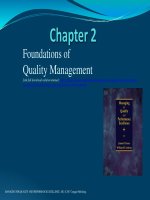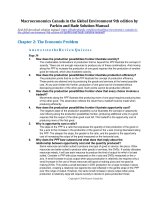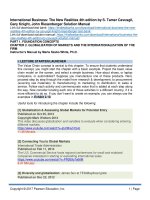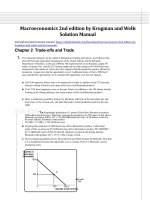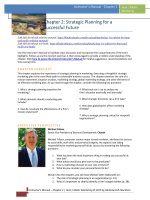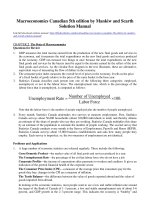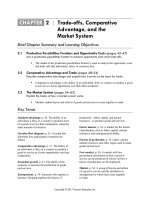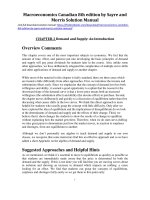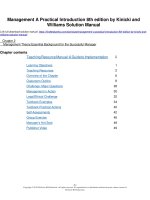The paralegal professional 4th edition by goldman and cheeseman solution manual
Bạn đang xem bản rút gọn của tài liệu. Xem và tải ngay bản đầy đủ của tài liệu tại đây (930.9 KB, 49 trang )
The Paralegal Professional 4th edition by Goldman and
Cheeseman Solution Manual
Link full download solution manual: />
________________________________________________________________________
Need to update Copyright © 2011 Pearson Education, Inc., publishing as Prentice Hall, 1
Lake Street, Upper Saddle River, New Jersey 07458. All rights reserved. Manufactured in the
United States of America. This publication is protected by Copyright, and permission should be
obtained from the publisher prior to any prohibited reproduction, storage in a retrieval system,
or transmission in any form or by any means, electronic, mechanical, photocopying, recording,
or likewise. To obtain permission(s) to use material from this work, please submit a written
request to Pearson Education, Inc., Permissions Department, One Lake Street, Upper Saddle
River, New Jersey.
Many of the designations by manufacturers and seller to distinguish their products are claimed
as trademarks. Where those designations appear in this book, and the publisher was aware of a
trademark claim, the designations have been printed in initial caps or all caps.
10 9 8 7 6 5 4 3 2 1
ISBN-13: 978-0-13-506609-6
ISBN-10:
0-13-506609-3
TABLE OF CONTENTS
Introduction…………………………………………………………………………….. 4
Chapter 1 The Paralegal Profession...…………………………………………………. 35
Chapter 2 Ethics and Professional Responsibility…………………………………….. 52
Chapter 3 The Paralegal Workplace…………………………………………………... 76
Chapter 4 Technology and the Paralegal………………………………………………100
Chapter 5 American Legal Heritage and Constitutional Law…………………………. 123
Chapter 6 The Court System and Alternative Dispute Resolution……………………. 140
Chapter 7 Civil Litigation……………………………………………………………... 157
Chapter 8 Criminal Law and Procedure ……………………………………………….177
Chapter 9 Administrative Law…………………………………………………………191
Chapter 10 Interviewing and Investigation Skills………………………………………198
Chapter 11 Legal Writing and Critical Legal Thinking……………………………….. 219
Chapter 12 Legal Research……………………………………………………………. 234
Chapter 13 Torts and Product Liability………………………………………………..253
Chapter 14 Contracts and E-Commerce……………………………………………….270
Chapter 15 Property Law………………………………………………………………288
Chapter 16 Estates and Elder Law…………………………………………………….. 305
Chapter 17 Family Law……………………………………………………………….. 321
Chapter 18 Agency, Employment and Immigration Law……………………………... 339
Chapter 19 Business Organizations and Bankruptcy………………………………….. 356
Chapter 20 Intellectual Property and Digital Law…………………………………….. 373
INTRODUCTION
CONGRATULATIONS! You have said yes. You have made the decision to give back to your
community, to contribute to your profession, and to educate the next generation of legal
professionals.
It is a daunting task. Maybe you have some training in teaching. Great!
More likely you don’t and have been selected for this teaching position because of your
reputation in the legal community. The materials that follow were written with you in mind by
someone who has been in your shoes. Fear not, your lack of training as a teacher is not a hurdle
you cannot overcome. Just use your analytical skills, common sense and the suggestions
provided in the pages that follow. The suggestions come from practical experience and represent
a collection of things learned over years of teaching, things I wish someone had told me before
the first day of class.
TEACHING SUGGESTIONS
You’ve been a student.
Think about your educational experiences. Recall the professors you loathed and loved.
Remember the classes you couldn’t get out of bed for and those that seemed to end too soon.
What were the teaching styles of those instructors? That is the place to start in your preparation
for the class you are about to teach. Specifically, adopt those qualities you loved and avoid those
you loathed.
Do not simply stand before the class and read the text or Power Point slides. Students know how
to read and many resent paying tuition for an instructor to read to them. Most learn better when
the text materials are brought to life, when discussion can take place that allows application of
the concepts to familiar problems. Listed below are three ways to bring the materials to life
along with some examples for each.
1. Use current events to demonstrate constitutional concepts or to explain the workings of
the judicial system.
a. Separation of Powers – President Obama appoints a new judge to the federal courts.
b. Criminal Proceedings – A judge, in a highly publicized criminal matter, rejects the plea
bargain agreement and sentences the defendant to the maximum period of
incarceration; motion for change of venue due to pretrial publicity. Current criminal
proceedings are popular topics for students to discuss.
2. Use your own experiences from the practice of law.
a. Attorney-Client Privilege – Privilege is waived when client asks friend to stay with
her for moral support during meeting with attorney
b. Civil Litigation Trial – Avoid showing video tape deposition of unavailable witness
after the lunch break; folks tend to be sleepy after lunch. What happens to you when you
are sleepy and sitting in front of a television?
3. Use student questions and experiences to create a dialogue
a. The Conflict Between Functions and Purposes of Law – Social Justice v. Morality
How can you have laws that protect against discrimination based upon sexual orientation
and have a law that says marriage is a union between one man and one woman?
b. The Fairness of the American Legal System – The criminal defendant with the financial
resources to retain three attorneys and countless experts will likely be found not guilty.
Keep in mind, a class that consists only of your war stories will be just as boring as one where
the instructor reads the text. Balance is the key in approaching your teaching assignment.
Creating a balanced approach with a mix of text, interesting hypotheticals and encouraging
dialogue gets students to think, discuss, evaluate and express themselves. Students love to
hear from those working in the profession, so do not overlook asking currently employed legal
professionals to be a guest speaker. Isn’t that what we want from the next generation of
paralegals?
Finally, be flexible enough to encourage dialogue and a collaborative environment but stay on
task and cover the materials. Students will realize that discussions are fun and interesting. They
may try to change your focus. Stay focused on a balanced presentation of the materials.
STUDENTS
Like any opposing counsel, client or trial you’ve encountered in the legal profession you expect
the best but prepare for the worst. You should expect the best from your students. Most will rise
to the expectations of those in positions of authority. However, don’t be surprised when students
fail to meet your personal standards. Furthermore, so long as you have done your best in
preparing for class and communicating the materials, you should not take personally the
individual performance of the student.
While ideally every student can produce “A” quality work, not every student will be prepared to
commit the time required. Each student will have his own learning style. Using the variety of
resources provided with the textbook and this instructor’s manual there should be something for
everyone. Students will also require different levels of independent study. It is not your
responsibility nor should you feel you have failed where students refuse to commit the time and
effort to succeed.
You have a distinct advantage in teaching this course. Although a required course for the
paralegal program, Introduction to Paralegal Studies is not a core curriculum requirement. Why
is this important? You wouldn’t be faced with thirty individuals who have to get through this
class to get to their major. The students registered for your class will have an interest in
Paralegal Studies. That interest motivates students to prepare for and attend class, complete
assignments and participate in class activities. Willing participants make teaching easier.
Many of the students that enroll in the Paralegal programs are “returning students”. These are folks
who have been out of school for some time. They find they need additional education to advance in
their field, or they face down sizing and need to be retrained for a new career, or they simply are
unhappy in their current employment and want to try something new. These students can bring their
life and work experience to the classroom. They question the concepts and challenge the doctrines.
The realty of textbook theory has been made all to clear to them via their
life experience. These students are a valuable resource for teaching. Their life experiences can
often make the text materials come to life. Avoid the tendency to let these discussions dominate
or over take class time. Remember balance.
HOW THE TEXT BOOK AND INSTRUCTOR’S MANUAL WILL HELP YOU
This instructor’s manual has been designed to get you on your way to a balanced teaching
approach. Below is a list of resources and how they will get you started.
Pre-Chapter Warm-up
In each chapter of the instructor’s manual there is an effort to use everyday examples to warmup the students to the subject matter. These everyday situations and questions which students can
relate to, without having legal training, can be used to stimulate the dialogue and introduce the
legal concepts.
Paralegals at Work
Every chapter of the text begins with a fact pattern designed to stimulate the students’ interest in
a particular legal area by setting forth a problem a paralegal is likely to face. The problem will
likely stimulate some discussion and the materials in the chapter will help the student see how
the problem should be resolved. The fact pattern is then used as part of the end of chapter
exercises to access student progress.
Chapter Lecture Outlines
For each chapter an extensive lecture outline is provided in the instructor’s manual.
Additionally, many of the chapter concepts are illustrated with hypothetical situations to
stimulate dialogue with the class. The format of the outline and inclusion of hypothetical
materials was designed with web learning in mind. While comprehensive, there is the ability
for you to modify the information, to tailor the materials to the needs of your students.
Video Component
This text includes a video component. There is a power point slide presentation to accompany
each chapter’s lecture notes. You also have at your disposal videos of typical trial proceedings,
discovery techniques, and situations raising ethical challenges for the paralegal. These video
productions can be useful for effectively demonstrating what happens in the office or at trial.
They can be used to stimulate class discussions, to reflect the concepts being taught or as
homework assignments. At the end of each chapter a video case study is presented with
accompanying questions suitable for all three suggested uses.
Text book Exercises and Portfolio Assignments
The textbook exercises and portfolio assignments are designed to give future paralegals more
than book knowledge. These assignments focus on ethics, computer skills, comprehension of
legal writing, an introduction to styles of legal writing and research, building collaborative skills
and more. The authors’ hope is that students will be able to complete their paralegal programs
and hit the ground running. In that regard it may be helpful for you to include, wherever
applicable, information particular to the jurisdiction in which you are teaching.
Answers to most questions are provided. Where answers may depend on individual choice,
student analysis, group participation or differences based on jurisdiction, a goal of concepts
that that should be included in each answer is provided to assist you in grading assignments.
Particular attention should be paid to the portfolio exercises. These projects are designed
specifically for students to create a portfolio of work to demonstrate their skills to potential
employers. Students may be required to prepare a resume, a complaint or a discovery request. If
your institution is an ABA approved program, these assignments can be part of the outcome
assessment piece maintained for ABA inspection. Check with your program director about the
types of documents that your program looks for from an introductory course in paralegal studies.
PREPARING FOR CLASS
As an instructor it is important to prepare for class. Lawyers rarely go to court without
preparation; it will be the same in the classroom as the courtroom. In the classroom, rather than
a jury, it is a group of up to thirty students who will be focusing on your every word and deed.
Needless to say, as an instructor, you must be familiar with the materials you will cover in class.
Most attorneys have the training and knowledge to discuss a legal topic, such as unreasonable
search and seizure under the Fourth Amendment to the U.S. Constitution, without taking time to
review or study. You should not rely entirely on this well of knowledge. While your experience
may make the information perfect for a colleague, it may be too complex for the average postsecondary-school student.
Students expect the classroom lecture to reinforce materials they have read in preparation for
class. Your classroom discussion must be tailored to your students, whose understanding and
participation will be based on the content of pre-class reading assignment. Thus, for you to best
tailor the lecture to the audience, read and review the materials the students are expected to read.
As you read, follow along with the lecture outline provided in this manual, take notes, highlight
areas of focus, delete extraneous material, add hypothetical situations from your experience,
include information particular to your jurisdiction. This preparation time will get you ready to
convey the concepts to the students. More importantly, it will serve to prepare you for the
questions students often ask.
In addition to being prepared by reading and reviewing the materials that the students are
expected to read an instructor will have other responsibilities. Some are simple, like starting and
ending class on time, reminding students of assignments and tests, making certain that
audio/visual aids are available and functional. Other obligations will require out-of-class time to
complete. Returning graded papers in a timely fashion is often overlooked. Try to return papers
and tests at the next class meeting but no later than one week after the assignment was
submitted or the test administered.
YOUR FIRST DAY OF CLASS
Students will often assess professors based upon what happens during that first day of class.
Are you prepared? Do you have a course schedule? Do you explain the course and the grading
structure? Do you have a push-over or a no-nonsense approach? What happens if a student
misses a class?
The first day is about first impressions and setting the tone for the semester. You’ll want to
establish your credibility as an instructor not only by what you do and say but also by how you
dress, being on time for class, starting and ending promptly. You will want to establish a rapport
with the students that encourages dialogue rather than fear. It is a good policy to distribute and
review the course schedule, grading and attendance policies, how students can contact you and
other administrative issues on the first day of class. It is also good to begin, if time permits, with
a warm-up activity like those provided with the lecture materials. Once again, the balanced
approach, being firm but approachable, demanding but fair is what will assist in creating the best
learning environment for students.
MODEL COURSE SYLLABI AND OUTLINE
Following is a model syllabus and four week-by-week course outlines for courses utilizing
The Paralegal Professional. For most paralegal programs, the director and staff may have
predetermined the course description, learning objectives, grading and ethics policies. Those
provided in the model below are general enough to satisfy most. Be sure to consult with your
program director before finalizing and distributing your syllabus and outline to students.
The first course outline is for a semester length course and includes a course description, course
objectives, and descriptions of instructional methods, grading, and course policies. The second
and third course outlines are for courses spanning two twelve-week quarters. The fourth course
outline is for a one twelve-week quarter course. The assignments suggested each week in each
course outline are offered as suggestions and may or may not be assigned at the instructor’s
discretion.
MODEL SYLLABUS
Course Title:
Credit Hours:
Prerequisite:
Instructor:
Course Number:
Course Length:
Semester:
Day/Time:
Course Description: A survey course designed to introduce students to the paralegal profession
and the role of a paralegal as member of the legal team. The student will be introduced to the
American legal system, civil litigation, criminal law and procedure, the appeals process, and
substantive legal topics. A basic introduction to the skills required of a successful paralegal,
such as legal vocabulary, critical reading, thinking and writing, interviewing, investigation, legal
research, law office administration, and technologies. Throughout this course, as well as the
entire paralegal program, an emphasis will be placed on legal ethics, professional regulation,
and current trends and issues in the paralegal field.
Objectives:
Upon successful completion of this course, the student will be able to:
1. Provide a functional definition of a paralegal, identify the careers available and
skills necessary for success.
2. Compare and contrast the roles of professional associations, regulations, and educational
requirements for entry into the paralegal profession.
3. Identify the role of other legal professionals and the paralegal’s relationship to
those individuals.
4. Explain, interpret, and apply the rules of ethics and professional responsibility
that govern legal professionals.
5. Acquire knowledge of fundamentals of business practices, communication with clients
and systemized law office operations.
6. Describe the structure of the American legal system and assess how that system
functions in regard to civil, criminal, and appellate legal processes.
7. Summarize and evaluate various areas of substantive law.
8. Demonstrate effective communication and critical thinking skills by utilizing appropriate
legal analysis and vocabulary in the production of oral and written discussions pertaining
to a variety of legal issues.
th
Texts: Henry R. Cheeseman & Thomas F. Goldman, The Paralegal Professional, 4 ed.
(Pearson, 2014).
Instructional Methods: This course will combine lecture, class discussion, and analytical
exercises. A variety of audio-visual material, guest speakers, and field trips may also be
included.
Grading: The student’s final grade will be determined on a point system and divided into the
following components and approximate proportions:
Class participation
Assignments
Quizzes
Midterm examination
Final examination
10%
25%
15%
25%
25%
The following grading scale shall be utilized as applied to the total points accumulated in
this class:
A = 90–100%
B = 80–89%
C = 70–79%
D = 60–69%
F = 0–59%
Attendance: Students are expected to attend every class meeting. A student whose absences
exceed 10% of the class meetings over the semester will be penalized by a reduction of his
final grade by 10 points.
Make-up Work: Since meeting deadlines is a necessary skill for the successful paralegal,
make-up work will be allowed only upon a showing of good cause. This policy applies to
missed assignments only. There is no extra credit work permitted.
Ethics Policy: Since a breach of the rules of professional ethics in the paralegal profession is
very serious and exposes the alleged violator to severe consequences, the same shall apply in
this class.
COURSE OUTLINE—ONE SEMESTER
The following is subject to variation at the discretion of the instructor.
Week 1
Reading Assignment: Chapter 1 – The Paralegal Profession
Appendix E – Effective Learning: How to Study
Lecture Topics:
(1) Review of the syllabus and overview of the course
(2) The role and function of the paralegal
(3) The paralegal profession as a career choice
(4) Professional paralegal organizations
(5) Career planning and skills development
Assignments:
((1) Working the Web
(2) Critical Thinking and Writing Questions
(3) Ethical Analysis and Discussion Questions
(4) Developing Your Collaboration Skills
(5) Video Case Studies
(6) Paralegal Portfolio Exercises
Week 2
Reading Assignment: Chapter 2 – Ethics and Professional Responsibility
Appendix B – NFPA’s Rules of Professional Conduct
Appendix C-Model Standards and Guidelines for Utilization
Of Legal Assistants-Paralegals
Lecture Topics:
(1) Unauthorized practice of law
(2) Regulation of paralegal profession
(3) Model Rules of Professional Conduct
(4) Paralegal association codes of ethics
(5) Five specific areas of ethical issues
Assignments:
(1) Working the Web
(2) Critical Thinking and Writing Questions
(3) Ethical Analysis and Discussion Questions
(4) Developing Your Collaboration Skills
(5) Video Case Studies
(6) Paralegal Portfolio Exercises
Week 3
Reading Assignment: Chapter 3 – The Paralegal Workplace
Lecture Topics:
(1) Paralegal employment environments
(2) Types of legal practices and specialties
(3) Paralegal job responsibilities
(4) Administrative functions of the paralegal
(5) Resume writing and interviewing skills
Assignments:
1) Working the Web
(2) Critical Thinking and Writing Questions
(3) Ethical Analysis and Discussion Questions
(4) Developing Your Collaboration Skills
(5) Video Case Studies
(6) Paralegal Portfolio Exercises
Field Trip:
Courthouse, government agency, or law firm tour
Guest Speaker:
Paralegals, Judges, Court Clerks, or Attorneys
Week 4
Reading Assignment: Chapter 4 – Technology and the Paralegal
Lecture Topics:
(1) Computer hardware
(2) Computer software and legal applications
(3) On-line resources
(4) The electronic office and courthouse
(5) Security
Assignments:
(1) Working the Web
(2) Critical Thinking and Writing Questions
(3) Ethical Analysis and Discussion Questions
(4) Developing Your Collaboration Skills
(5) Video Case Studies
(6) Paralegal Portfolio Exercises
Field Trip:
Computer Lab, Law Library, Demo of Westlaw, Lexis, etc.
Week 5
Reading Assignment: Chapter 5 – American Legal Heritage and Constitutional Law
Chapter 6 – The Court System and Alternative Dispute Resolution
Appendix D – The Constitution of the United States
Lecture Topics:
Assignments:
(1) Working the Web
(1) History and sources of American law
(2) U.S. Constitution
(3) Federal and state court systems
(4) Standing and jurisdiction
(5) Alternative dispute resolution
(2) Critical Thinking and Writing Questions
(3) Ethical Analysis and Discussion Questions
(4) Developing Your Collaboration Skills
(5) Video Case Studies
(6) Paralegal Portfolio Exercises
Field Trip:
Courthouse
Week 6
Reading Assignment: Chapter 7 – Civil Litigation
Chapter 8 – Criminal Law and Procedure
Lecture Topics:
(1) Civil litigation purpose and process
(2) Pleadings, discovery and trial
(3) Appellate process
(4) Criminal procedure
(5) Criminal trial process
(6) Constitutional safeguards
Assignments:
(1) Working the Web
(2) Critical Thinking and Writing Questions
(3) Ethical Analysis and Discussion Questions
(4) Developing Your Collaboration Skills
(5) Video Case Studies
(6) Paralegal Portfolio Exercises
Field Trip:
Criminal court
Week 7
Reading Assignment: Chapter 9-Administrative Law
Chapter 10 – Interviewing and Investigation Skills
Lecture Topics:
(1) Functions and powers of administrative agencies
(2) Initial and subsequent client interviews
(3) Implied attorney-client relationship
(4) Locating and interviewing expert and lay witnesses
(5) Investigation of claims
(6) Obtaining and preserving evidence
Assignments:
(1) Working the Web
(2) Critical Thinking and Writing Questions
(3) Ethical Analysis and Discussion Questions
(4) Developing Your Collaboration Skills
(5) Video Case Studies
(6) Paralegal Portfolio Exercises
Week 8
Reading Assignment: Chapter 12 –Legal Research
Chapter 11 – Legal Writing and Critical Legal
Thinking Appendix A – How to Brief a Case
Lecture Topics:
(1) Traditional and computer-assisted legal resources
(2) Distinguishing between primary, secondary, mandatory and
persuasive sources
(3) Updating legal research
(4) Critical legal thinking and writing
(5) Duty of Candor
(6) Court briefs and memoranda of law
(7) Citation checking
Assignments:
(1) Working the Web
(2) Critical Thinking and Writing Questions
(3) Ethical Analysis and Discussion Questions
(4) Developing Your Collaboration Skills
(5) Video Case Studies
(6) Paralegal Portfolio Exercises
Field trip:
Law Library
MID-TERM EXAMINATION, Chapters 1–12 and Appendices A–Ff
Week 9
Reading Assignment: Chapter 13 - Torts and Product Liability
Lecture Topics:
(1) Intentional torts
(2) Elements of negligence
(3) Special negligence doctrines
(4) Defenses to negligence
(5) Strict and Product Liability
Assignments:
(1) Working the Web
(2) Critical Thinking and Writing Questions
(3) Ethical Analysis and Discussion Questions
(4) Developing Your Collaboration Skills
(5) Video Case Studies
(6) Paralegal Portfolio Exercises
Week 10
Reading Assignment: Chapters 14- Contracts and E-Commerce
Lecture Topics:
(1) Requirements of a contract and Statute of Frauds
(2) Performance and breach of contract
(3) Contractual remedies
(4) UCC
(5) E-commerce
Assignments:
(1) Working the Web
(2) Critical Thinking and Writing Questions
(3) Ethical Analysis and Discussion Questions
(4) Developing Your Collaboration Skills
(5) Video Case Studies
(6) Paralegal Portfolio Exercises
Week 11
Reading Assignment: Chapter 15 – Property Law
Lecture Topics:
(1) Personal property and bailments
(2) Real property and transfer of ownership
(3) Landlord tenant relationship
(4) Land use control
Assignments:
(1) Working the Web
(2) Critical Thinking and Writing Questions
(3) Ethical Analysis and Discussion Questions
(4) Developing Your Collaboration Skills
(5) Video Case Studies
(6) Paralegal Portfolio Exercises
Week 12
Reading Assignment: Chapter 16 – Estates and Elder Law
Lecture Topics:
(1) Formation and types of wills
(2) Probate
(3) Intestacy
(4) Living Will
(5) Formation and types of trusts
Assignments:
(1) Working the Web
(2) Critical Thinking and Writing Questions
(3) Ethical Analysis and Discussion Questions
(4) Developing Your Collaboration Skills
(5) Video Case Studies
(6) Paralegal Portfolio Exercises
Week 13
Reading Assignment: Chapter 17 – Family Law
Lecture Topics:
(1) Engagement and Premarital issues
(2) Requirements for formation of valid marriage
(3) Parental relationship and obligations
(4) Dissolution of marriage
(5) Division of property and alimony
(6) Child custody and support
Assignments:
(1) Working the Web
(2) Critical Thinking and Writing Questions
(3) Ethical Analysis and Discussion Questions
(4) Developing Your Collaboration Skills
(5) Video Case Studies
(6) Paralegal Portfolio Exercises
Week 14
Reading Assignment: Chapter 18 – Agency, Employment & Immigration Law
Lecture Topics:
(1) Nature, types, and formation of agency relationships
(2) Liabilities to third parties
(3) Termination of agency relationship
(4) Statutory constraints on the employment relationship
Assignments:
(1) Working the Web
(2) Critical Thinking and Writing Questions
(3) Ethical Analysis and Discussion Questions
(4) Developing Your Collaboration Skills
(5) Video Case Studies
(6) Paralegal Portfolio Exercises
Week 15
Reading Assignment: Chapter 19 – Business Organizations and Bankruptcy Law
Lecture Topics:
(1) Types of business organizations
(2) Formation of business organizations
(3) Benefits and obligations of business organizations
(4) Benefits and types of bankruptcy
Assignments:
(1) Working the Web
(2) Critical Thinking and Writing Questions
(3) Ethical Analysis and Discussion Questions
(4) Developing Your Collaboration Skills
(5) Video Case Studies
(6) Paralegal Portfolio Exercises
Week 16
Reading Assignment: Chapter 20 – Intellectual Property and Digital Law
Lecture Topics:
(1) Trade Secrets
(2) Patents
(3) Copyrights
(3) Trademarks
(4) Cyber law
Assignments:
(1) Working the Web
(2) Critical Thinking and Writing Questions
(3) Ethical Analysis and Discussion Questions
(4) Developing Your Collaboration Skills
(5) Video Case Studies
(6) Paralegal Portfolio Exercises
FINAL EXAMINATION, Chapters 13–20
TWO-QUARTER COURSE OUTLINE
First Quarter
The following is subject to variation at the discretion of the instructor.
Week 1
Reading Assignment: Chapter 1 – The Paralegal Profession
Appendix E – Effective Learning: How to Study
Lecture Topics:
(1) Review of the syllabus and overview of the course
(2) The role and function of the paralegal
(3) The paralegal profession as a career choice
(4) Professional paralegal organizations
(5) Career planning and skills development
Assignments:
(1) Working the Web
(2) Critical Thinking and Writing Questions
(3) Ethical Analysis and Discussion Questions
(4) Developing Your Collaboration Skills
(5) Video Case Studies
(6) Paralegal Portfolio Exercises
Week 2
Reading Assignment: Chapter 2 – Ethics and Professional Responsibility Appendix
B –NFPA’s Rules of Professional Conduct Appendix C-Model
Standards and Guidelines for Utilization of Legal AssistantsParalegals
Lecture Topics:
(1) Unauthorized practice of law
(2) Regulation of paralegal profession
(3) Model Rules of Professional Conduct
(4) Paralegal association codes of ethics
(5) Five specific areas of ethical issues
Assignments:
(1) Working the Web
(2) Critical Thinking and Writing Questions
(3) Ethical Analysis and Discussion Questions
(4) Developing Your Collaboration Skills
(5) Video Case Studies
(6) Paralegal Portfolio Exercises
Week 3
Reading Assignment: Chapters 3 – The Paralegal Workplace
Lecture Topics:
(1) Paralegal employment environments
(2) Types of legal practices and specialties
(3) Paralegal job responsibilities
(4) Administrative functions of the paralegal
(5) Resume writing and interviewing skills
Assignments:
(1) Working the Web
(2) Critical Thinking and Writing Questions
(3) Ethical Analysis and Discussion Questions
(4) Developing Your Collaboration Skills
(5) Video Case Studies
(6) Paralegal Portfolio Exercises
Field Trip:
Guest Speaker:
Courthouse, government agency, or law firm tour
Working paralegal
Week 4
Reading Assignment: Chapter 4 – Technology and the Paralegal
Lecture Topics:
(1) Computer hardware
(2) Computer software and legal applications
(3) On-line resources
(4) The electronic office and courthouse
(5) Security
Assignments:
(1) Working the Web
(2) Critical Thinking and Writing Questions
(3) Ethical Analysis and Discussion Questions
(4) Developing Your Collaboration Skills
(5) Video Case Studies
(6) Paralegal Portfolio Exercises
Field Trip:
Computer Lab, demo of software
Week 5
Reading Assignment: Chapter 5 – American Legal Heritage and Constitutional Law
Appendix F – The Constitution of the United States
Lecture Topics:
(1) History and sources of American law
(2) U.S. Constitution
Assignments:
(1) Working the Web
(2) Critical Thinking and Writing Questions
(3) Ethical Analysis and Discussion Questions
(4) Developing Your Collaboration Skills
(5) Video Case Studies
(6) Paralegal Portfolio Exercises
Week 6
Reading Assignment: Chapter 6 – The Court System and ADR
Lecture Topics:
(1) Federal and state court systems
(2) Standing and jurisdiction
(3) Alternative dispute resolution
Assignments
(1) Working the Web
(2) Critical Thinking and Writing Questions
(3) Ethical Analysis and Discussion Questions
(4) Developing Your Collaboration Skills
(5) Video Case Studies
(6) Paralegal Portfolio Exercises
Field Trip:
Courthouse
MIDTERM EXAMINATION CHAPTERS 1-6 AND Proper APPENDICIES
Week 7
Reading Assignment: Chapter 7 – Civil Litigation
Lecture Topics:
(1) Civil litigation purpose and process
(2) Pleadings
(3) Discovery
(4) Pretrial activities and trial
(5) Appellate process
Assignments:
(1) Working the Web
(2) Critical Thinking and Writing Questions
(3) Ethical Analysis and Discussion Questions
(4) Developing Your Collaboration Skills
(5) Video Case Studies
(6) Paralegal Portfolio Exercises
Week 8
Reading Assignment: Chapter 8 – Criminal Law and Procedure
Lecture Topics:
(1) Criminal procedure and protections
(2) Criminal trial process
Assignments:
(1) Working the Web
(2) Critical Thinking and Writing Questions
(3) Ethical Analysis and Discussion Questions
(4) Developing Your Collaboration Skills
(5) Video Case Studies
(6) Paralegal Portfolio Exercises
Week 9
Reading Assignment: Chapter 9-Administrative Law
Chapter 10 – Interviewing and Investigation Skills
Lecture Topics:
(1) Functions and types of administrative agencies
(2) Initial and subsequent client interviews
(3) Implied attorney-client relationship
(4) Locating and interviewing expert and lay witnesses
(5) Investigation of claims
(6) Obtaining and preserving evidence
Assignments:
(1) Working the Web
(2) Critical Thinking and Writing Questions
(3) Ethical Analysis and Discussion Questions
(4) Developing Your Collaboration Skills
(5) Video Case Studies
(6) Paralegal Portfolio Exercises
Week 10
Reading Assignment: Chapter 11 –Legal Research
Lecture Topics:
(1) Traditional and computer-assisted legal resources
(2) Distinguishing between primary, secondary, mandatory and
persuasive sources
(3) Updating legal research
Assignments:
(1) Working the Web
(2) Critical Thinking and Writing Questions
(3) Ethical Analysis and Discussion Questions
(4) Developing Your Collaboration Skills
(5) Video Case Studies
(6) Paralegal Portfolio Exercises
Field Trip:
Week 11
Law library
Reading Assignment: Chapter 12 – Legal Writing and Critical Legal Thinking
Lecture Topics:
(1) Critical legal thinking and writing
(2) Duty of Candor
(3) Court briefs and memoranda of law
(4) Citation checking
Assignments:
(1) Working the Web
(2) Critical Thinking and Writing Questions
(3) Ethical Analysis and Discussion Questions
(4) Developing Your Collaboration Skills
(5) Video Case Studies
(6) Paralegal Portfolio Exercises
Week 12
Reading Assignment: Appendix A – How to Brief a Case
Lecture Topics:
(1) Difference between legal and case briefs
(2) Writing a brief
Assignments:
(1) Write a case brief
FINAL EXAMINATION, Chapters 7–12 and Appendix A
TWO-QUARTER COURSE OUTLINE
Second Quarter
The following is subject to variation at the discretion of the instructor.
Week 1
Reading Assignment: Chapter 13 - Torts
Lecture Topics:
(1) Intentional torts
(2) Elements of negligence
(3) Special negligence doctrines
(4) Defenses to negligence
Assignments:
(1) Working the Web
(2) Critical Thinking and Writing Questions
(3) Ethical Analysis and Discussion Questions
(4) Developing Your Collaboration Skills
(5) Video Case Studies
(6) Paralegal Portfolio Exercises
Week 2
Reading Assignment: Chapter 13 – Torts
Lecture Topic:
(1) Strict and Products Liability
Assignment:
(1) Working the Web
(2) Critical Thinking and Writing Questions
(3) Ethical Analysis and Discussion Questions
(4) Developing Your Collaboration Skills
(5) Video Case Studies
(6) Paralegal Portfolio Exercises
Guest Lecturer:
Attorney whose practice is limited to Products Liability or
Professional Malpractice
Week 3
Reading Assignment: Chapters 14 - Contracts and E-Commerce
Lecture Topics:
(1) Requirements of a contract and Statute of Frauds
(2) Performance and breach of contract
(3) Contractual remedies
Assignments:
(1) Working the Web
(2) Critical Thinking and Writing Questions
(3) Ethical Analysis and Discussion Questions
(4) Developing Your Collaboration Skills
(5) Video Case Studies
(6) Paralegal Portfolio Exercises
Week 4
Reading Assignment: Chapter 14 – Contracts and E-Commerce
Lecture Topic:
(1) UCC
(2) E-commerce
Assignments:
(1) Working the Web
(2) Critical Thinking and Writing Questions
(3) Ethical Analysis and Discussion Questions
(4) Developing Your Collaboration Skills
(5) Video Case Studies
(6) Paralegal Portfolio Exercises
Week 5
Reading Assignment: Chapter 15 – Property Law
Lecture Topics:
(1) Personal property and bailments
(2) Real property and transfer of ownership
(3) Landlord tenant relationship
(4) Land use control
Assignments:
(1) Working the Web
(2) Critical Thinking and Writing Questions
(3) Ethical Analysis and Discussion Questions
(4) Developing Your Collaboration Skills
(5) Video Case Studies
(6) Paralegal Portfolio Exercises
Field Trip:
Registrar of Deeds’ Office
Week 6
Reading Assignment: Chapter 16 – Estates and Elder Law
Lecture Topics:
(1) Formation and types of wills
(2) Probate
(3) Intestacy
(4) Living Will
(5) Formation and types of trusts
Assignments:
(1) Working the Web
(2) Critical Thinking and Writing Questions
(3) Ethical Analysis and Discussion Questions
(4) Developing Your Collaboration Skills
(5) Video Case Studies
(6) Paralegal Portfolio Exercises
MIDTERM EXAMINATION CHAPTERS 13-16
Week 7
Reading Assignment: Chapter 17 – Family Law
Lecture Topics:
(1) Engagement and Premarital issues
(2) Requirements for formation of valid marriage
(3) Parental relationship and obligations
(4) Dissolution of marriage
(5) Division of property and alimony
(6) Child custody and support
Assignments:
(1) Working the Web
(2) Critical Thinking and Writing Questions
(3) Ethical Analysis and Discussion Questions
(4) Developing Your Collaboration Skills
(5) Video Case Studies
(6) Paralegal Portfolio Exercises
Week 8
Reading Assignment: Chapter 18 – Agency, Employment and Immigration Law
Lecture Topics:
(1) Nature, types, and formation of agency relationships
(2) Liabilities to third parties
(3) Termination of agency relationship
(4) Statutory constraints on the employment relationship
Assignments:
(1) Working the Web
(2) Critical Thinking and Writing Questions
(3) Ethical Analysis and Discussion Questions
(4) Developing Your Collaboration Skills
(5) Video Case Studies
(6) Paralegal Portfolio Exercises
Week 9
Reading Assignment: Chapter 19 – Business Organizations and Bankruptcy Law
Lecture Topics:
(1) Types of business organizations
(2) Formation of business organizations
(3) Benefits and obligations of business organizations
Assignments:
(1) Working the Web
(2) Critical Thinking and Writing Questions
(3) Ethical Analysis and Discussion Questions
(4) Developing Your Collaboration Skills
(5) Video Case Studies
(6) Paralegal Portfolio Exercises
Week 10
Reading Assignment: Chapter 18Business Organizations and Bankruptcy
Lecture Topics:
(1) Types and advantages of bankruptcy
Assignments:
(1) Working the Web
(2) Critical Thinking and Writing Questions
(3) Ethical Analysis and Discussion Questions
(4) Developing Your Collaboration Skills
(5) Video Case Studies
(6) Paralegal Portfolio Exercises
Week 11
Reading Assignment: Chapter 20 – Intellectual Property and Digital Law
Lecture Topics:
(1) Trade Secrets
(2) Patents
(3) Copyrights
(3) Trademarks
(4) Cyber law
Assignments:
(1) Working the Web
(2) Critical Thinking and Writing Questions
(3) Ethical Analysis and Discussion Questions
(4) Developing Your Collaboration Skills
(5) Video Case Studies
(6) Paralegal Portfolio Exercises
Week 12
